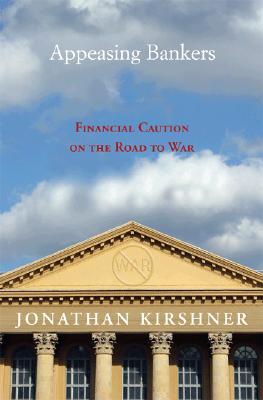

 Princeton University Press
Princeton University Press
Appeasing Bankers: Financial Caution on the Road to War


Key Metrics
- Jonathan Kirshner
- Princeton University Press
- Paperback
- 9780691134611
- 9.17 X 6.27 X 0.59 inches
- 0.78 pounds
- Business & Economics > Economic History
- English
 Secure Transaction
Secure TransactionBook Description
In Appeasing Bankers, Jonathan Kirshner shows that bankers dread war--an aversion rooted in pragmatism, not idealism. Sound money, not war is hardly a pacifist rallying cry. The financial world values economic stability above all else, and crises and war threaten that stability. States that pursue appeasement when assertiveness--or even conflict--is warranted, Kirshner demonstrates, are often appeasing their own bankers. And these realities are increasingly shaping state strategy in a world of global financial markets. Yet the role of these financial preferences in world politics has been widely misunderstood and underappreciated. Liberal scholars have tended to lump finance together with other commercial groups; theorists of imperialism (including, most famously, Lenin) have misunderstood the preferences of finance; and realist scholars have failed to appreciate how the national interest, and proposals to advance it, are debated and contested by actors within societies. Finance's interest in peace is both pronounced and predictable, regardless of time or place. Bankers, Kirshner shows, have even opposed assertive foreign policies when caution seems to go against their nation's interest (as in interwar France) or their own long-term political interest (as during the Falklands crisis, when British bankers failed to support their ally Margaret Thatcher). Examining these and other cases, including the Spanish-American War, interwar Japan, and the United States during the Cold War, Appeasing Bankers shows that, when faced with the prospect of war or international political crisis, national financial communities favor caution and demonstrate a marked aversion to war.
Author Bio
Jonathan Kirshner is Professor of Political Science and International Studies. His research and teaching interests focus on international relations, political economy (especially macroeconomics and money), and politics and film. His current research includes projects on classical realism, the international political implications of the financial crisis and its aftermath, and the politics of mid-century cinema.
Prior to joining Boston College, Kirshner was the Stephen and Barbara Friedman Professor of International Political Economy in the Department of Government at Cornell University. At Cornell, he also served as director of the Reppy Institute for Peace and Conflict Studies from 2007 to 2015, and was the recipient of the Provost’s Award for Distinguished Scholarship and the Stephen and Margery Russell Distinguished Teaching Award.
Recent books include American Power after the Financial Crisis, and Hollywood’s Last Golden Age: Politics, Society and the Seventies Film in America. His first book, Currency and Coercion, explored how states manipulate international monetary relations to advance security-related goals. Another book, Appeasing Bankers: Financial Caution on the Road to War, illustrated how financial interests (such as banks) and international financial markets can shape and constrain states’ grand strategies and influence decisions about war and peace. Appeasing Bankers won the best book award from the International Security Studies Section of the International Studies Association.
Kirshner was the first World Politics Visiting Fellow at Princeton University’s Institute for International and Regional Studies, and was the director of the Economics and National Security Program at the Olin Institute at Harvard University from 2000-04. With Eric Helleiner, he is the co-editor of the multi-disciplinary book series “Cornell Studies in Money,” as well as the books The Great Wall of Money: Power and Politics in China’s International Monetary Relations and The Future of the Dollar.
Source: Boston College
Videos










Community reviews
Write a ReviewNo Community reviews